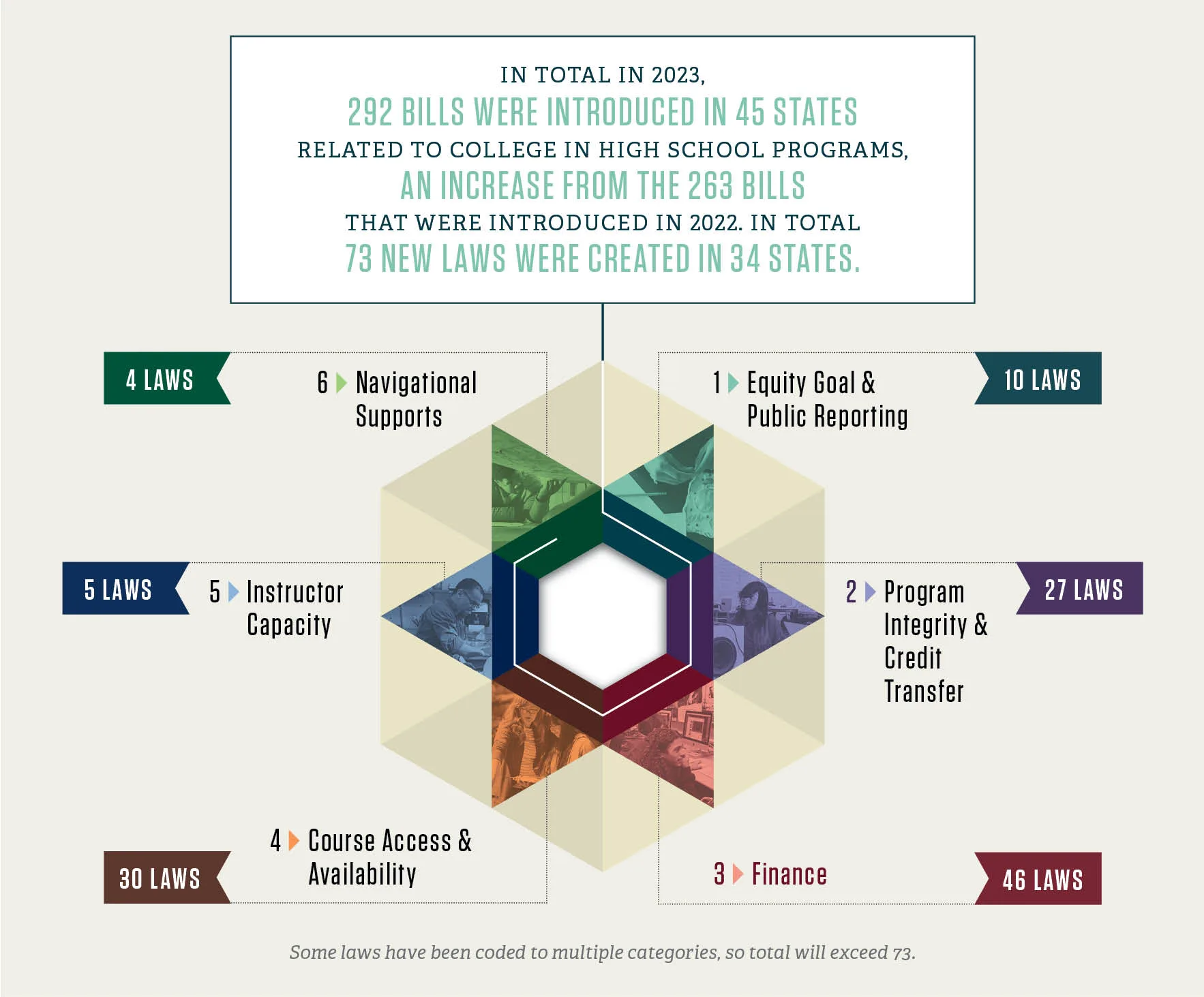
In January 2024, CHSA released a 2023 Year in Review for its State Legislative Tracker. This policy resource summarizes the new state laws adopted in 2023, and summarizes the key trends.
Policies impacting college in high school programs such as dual enrollment, concurrent enrollment, and early college high school continued to be significant across the country in 2023, with an overall increase in the number of bills introduced in 2023 over 2022, and the number of bills that became law. In total, 292 bills were introduced in 45 states, with 73 new laws created in 34 states.
Using the College in High School Alliance’s framework for state policy explained in Unlocking Potential: A State Policy Roadmap for Equity and Quality in College in High School Programs, breaking down the enacted laws by the six categories of the framework shows that the biggest areas of activity this year were in Finance and Program Integrity and Credit Transfer.
Notable New Laws:
- Arizona SB 1729 - Arizona completed the first major update to its laws governing dual enrollment in the state for a number of years, creating a Dual Enrollment Student Development Fund and a Dual Enrollment Teacher Development Fund to incentivize the expansion of dual enrollment opportunities in the state, as well as created an annual report on dual enrollment in Arizona and strengthened the ability of students with disabilities to access these programs.
- Florida HB 5101 - Florida made instructional materials free for all dual enrollment students.
- Illinois HB 3224 - This law strengthens the ability of students with disabilities to access dual enrollment by requiring that a school district provide information about dual credit opportunities to students and parents during transition planning, as well as requiring dual credit course participation to appear on the student’s transition activities under their Individualized Education Plan (IEP).
- Nebraska LB 705 - Nebraska becomes the latest state to provide state funding to support instructor credentialing in dual enrollment by creating the Career-Readiness and Dual-Credit Education Grant Program. This program will lead to the establishment of teacher education pathways enabling the instruction of dual-credit courses and career and technical education courses, and provides grants to teachers enrolled in these pathways.
- Texas HB 8 - Texas has created the Financial Aid for Swift Transfer (FAST) program to provide funds to cover the costs to allow for low income students to enroll at no cost to the student in dual credit courses at participating institutions of higher education.
- Washington SB 5048 - Under this law, Washington has eliminated costs for students to participate in the state’s College in the High School program, its concurrent enrollment program, and established an annual report for performance of the program.
Other Trends:
In 2023, states made significant strides in addressing costs for participating in dual enrollment, a significant equity barrier for students, though in some cases – such as Florida’s elimination of textbook costs for students mentioned above – there are questions about how the state will fund the costs of providing these experiences for students in the absence of collecting payments from students. This will continue to be an important discussion as a number of other states continue to look at implementing a dual enrollment funding model or revamping or tweaking their existing model.
This year also saw notable continued movement on student access questions, particularly for students with disabilities, with three states (Arizona, Illinois, and Massachusetts) implementing legislation designed to support student access for students with disabilities. The last notable trend this year is the ongoing movement of dual enrollment legislation away from funding bespoke or limited programs towards statewide strategies for the model, such as in Arizona and Texas.
Summaries of each of the new laws impacting college in high school programs are included in the full resource.
For summaries and more information about all of the bills introduced in 2023 - and to keep up to date on bills introduced in 2024 - visit the College in High School Alliance’s State Legislative and Regulatory Tracker.

